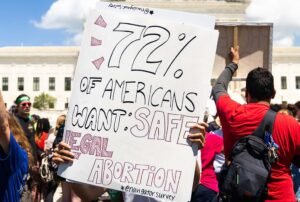
May 20, 2019; Harper’s Bazaar
This month, as a number of states passed draconian abortion laws, the groups advocating against strict restrictions or providing reproductive health services experienced a now-familiar phenomenon in surging rates of contact from people seeking to respond—in this case, women. Some are dedicated to making sure those services and rights continue to exist; others are anxious about their ability to access those services themselves now or in the future. The response from most of these groups shows they see this more as a moment for base-building and a time to reassure women rather than an opportunity to fundraise, and their statements reflect that stance. MarketWatch spoke to Toni Van Pelt, president of the National Organization for Women (NOW).
NOW wouldn’t disclose exactly how much supporters have donated, as they are more focused on answering people’s concerns about the bans than counting the cash coming in, but she said that many “large” donations have been received over the last two days. And any donation of $1,000 or more is considered “large,” she said.
Sign up for our free newsletters
Subscribe to NPQ's newsletters to have our top stories delivered directly to your inbox.
By signing up, you agree to our privacy policy and terms of use, and to receive messages from NPQ and our partners.
“I’m surprised at how many have come in,” she added. “Many of these women that are contacting us are of a certain age that remember when abortion was illegal, that suffered through illegal abortions or having family members that died because of an illegal abortion, and they’re frightened. They’re really scared.”
Concern about immediate needs has led local groups like Alabama’s Yellowhammer Fund to serve as vehicles for the frustrations of women’s health supporters nationwide. The Yellowhammer Fund covers travel and accommodation expenses for women who travel in or out of Alabama to get an abortion, and partners with P.O.W.E.R. (People Organizing for Women’s Empowerment & Rights) House next to the Montgomery abortion clinic to provide a supportive place to stay. Last week, they raised $100,000 in a single day—more than they raised in more than a year before.
Founder Amanda Reyes said that the average cost per woman is $180–$200, and her organization paid for 313 women’s abortions last year. But this week, thanks to a Daily Kos story that linked to Yellowhammer’s fundraising page, their budget has exploded. Reyes told Erica Gonzalez at Harper’s Bazaar that her organization “can’t keep up.” (Because Yellowhammer Fund is a new organization, there’s no Form 990 available to compare this windfall with prior spending.)
NPQ has reported before on organizations that received waves of donations after a regressive policy or law or election or all of the above threatened civil or human rights. The American Civil Liberties Union (ACLU) brought in over $90 million in 2017, Planned Parenthood received 800,000 donations in three days after President Trump’s election, and RAICES Texas raised over twice its annual yearly revenue in a week when the issue of family separations was being surfaced. The question, then, of what to do with these “surges” of interest has become increasingly important. How can these moments build movement and the range of protections needed, as well as bulk up coffers to ensure sufficient resources to deploy the right strategies at the right time? What’s the most strategic way to use the money? Networks are vital here, and we need to remember to maintain them even in less threatening times—then, when we need trust for collaboration, it will be there for us to use to develop coordinated and complete strategies across organizational boundaries.—Erin Rubin













